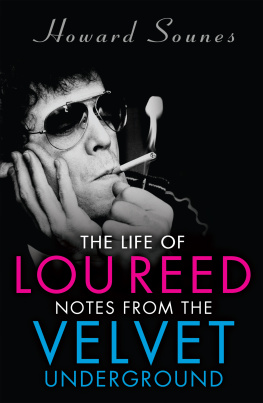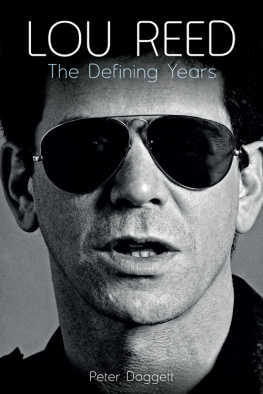
THE LIFE OF
LOU REED
ALSO BY
Howard Sounes
Amy, 27
Fab: An Intimate Life of Paul McCartney
Heist
Seventies
The Wicked Game
Down the Highway: The Life of Bob Dylan
Bukowski in Pictures
Charles Bukowski: Locked in the Arms of a Crazy Life
Fred & Rose
For more information about Howard Sounes and his books, visit his
website at www.howardsounes.com.


Diversion Books
A division of Diversion Publishing Corp.
443 Park Avenue South, suite 1004
New York, NY 10016
www.diversionbooks.com
Copyright 2019 by Howard Sounes
All rights reserved, including the right to reproduce this book
or portions thereof in any form whatsoever.
For more information, email
First Diversion Books edition September 2019
Hardcover ISBN: 978-1-63576-638-7
eBook ISBN: 978-1-63576-641-7
First published in the United Kingdom by Transworld Publishers.
Printed in The United States of America
1 3 5 7 9 10 8 6 4 2
Library of Congress cataloging-in-publication data is available on file.
CONTENTS
I
CONEY ISLAND BABY
194259
L ISTEN. LOU REED HAS fallen silent. That black-clad curmudgeon, the rock n roll poet they called the King of New York, co-founder of the Velvet Underground band, master of the wry, observational lyric, author of Walk on the Wild Side, Heroin and Sweet Jane, among hundreds of extraordinary and some quite ordinary songs, is dead. Lou lived so fast, he drank so much and he took so many drugs that few expected him to live to seventy-one. But now he has sung his last song. What was he really like?
ONE QUICK STORY SERVES as a paradigm. In the autumn of 1963, when Lou was twenty-one, he drove to St. Lawrence University in upstate New York with his college band to perform at a fraternity weekend. The terms of the engagement were that LA and the Eldorados would play at a student dance on Friday night, then for an hour on a pleasure boat on the St. Lawrence River on Saturday afternoon, before performing at a fraternity party in the evening. Im not playing on the boat, Lou announced when they arrived, having decided that this was beneath his dignity. The others looked at their band mate in exasperation. Lou was a slim young man of 140 pounds, five foot ten, with simian features, short, stubby fingers, bushy brown hair and clever brown eyes. The left eye was lazy, giving him a sly appearance. He spoke in a whiny, theatrical voice and gave the general impression of being trouble. He was just a prick, says band mate Richard Mishkin, using a word that many friends chose to describe Lou over the years. Yet he was the heart and soul of LA and the Eldorados, their lead singer and guitarist, and they couldnt go on without him.
You dont have a choice, Richard told him. You are going to play on the boat and be happy.... They are paying us a lot of money, and you have to do it.
That was not the way to speak to Lou, ever. Mishkin, fuck you! he retorted, thrusting his right hand through a glass door. Lou laughed as he looked at the injury he had done to himself, blood streaming down his arm as he held his hand up.
Because he doesnt have to play now, explains Richard, who took Lou to the hospital for stitches. Hes won!
As he would show time and again during his long career, Lou would rather harm himself than be coerced into doing anything he didnt believe in. Such integrity is a mark of a true artist. It also helps explain why Lou never achieved as much success as he craved, or deserved.
THIS TALENTED, DIFFICULT MAN was born Lewis Alan Reed at Beth-El Hospital in Brooklyn, New York, on Monday, March 2, 1942. A story later emerged that his real name was Louis Firbank, and this name is still cited in books and articles; it is completely erroneous. Some friends called him by his given name of Lewis, which he didnt object to, though he disliked his middle name, but to most people he would always be Lou. Lewis was his name, [but] it wasnt him, says his brother-in-law, Harold Weiner. He was Lou.
The temperature fell below freezing the night Lou was born, bringing snow to the five boroughs of New York City, of which Brooklyn is the second largest and most populous: eighty-one square miles of tightly packed houses, tenements, shops and factories, bisected by pot-holed highways, tram lines and rust-brown elevated train tracks; the teeming borough separated from its more glamorous neighbor Manhattan by the East River, spanned by the majestic Brooklyn Bridge. It was wartime and the newspapers were full of stories of Americas struggle with the Japs, as well as the wider world war against the Hitler Axis. The mood at home was patriotic but jittery, with fears of attacks on the mainland. The day after Lou was born, to everyones dismay, the Brooklyn Eagle reported the sinking of a US destroyer by a German U-boat off the coast of New Jersey. The paper also warned its readers that the lights would shine as usual at Brooklyns fun fair, Coney Island, that summer, but at the sound of an alert signal the entire amusement area will be blacked out. In a time that has passed into history, men and women hurrying home from work in the snow were formally dressed, nearly everybody wore a hat and an overcoat and most adults smoked cigarettes. New releases at the cinema included Woman of the Year , with Spencer Tracy and Katharine Hepburn; while Eddie Cantor promised to keep you laughing in black face in a Broadway show called Banjo Eyes , a production that would now be considered outrageously racist. Lou was capable of casual racism himself in later life.
There was a substantial African-American community in Brooklyn, part of the boroughs heterogeneous mix of races and creeds, enlarged and diversified by waves of immigrants. Lous family was part of that classic American story. His father, Sidney Joseph Rabinowitz, was born in New York in 1913, the son of Russian Jews who had immigrated to America to escape persecution. Sids father, Mendel, was a printer who went bankrupt during the Depression, so Sid had known hard times. At the outbreak of the Second World War, the family was living in a tenement in Borough Park.
I know what it is like to be on the outside. I know what its like to have an unhappy childhood, Lou said in 1992, going to the root of his formative experiences. His principal problem was with his father. Lous sister concedes that dad had his faults. Sid was controlling and rigid and, like his son, [he] could be a verbal bully. At the end of his life Lou told his friend the artist Julian Schnabel a story about how he had once reached out to his father, only for Sid to hit him. He put his hand near his father, and his father kind of smacked him. He never got over that, reports Schnabel. He felt the cruelty of that. Father and son may have been too alike. Sid had a quick wit, he enjoyed music and had ambitions to become an author. His mother persuaded him to study to become an accountant instead, a steady job that enabled him to join the middle class, but not work in which he could express himself. He was, perhaps, a frustrated man.
Radical politics thrived in blue-collar Brooklyn in the forties. Sids cousin Shulamit Shirley Rabinowitz caused such a stir in the garment industry, agitating for better pay, that the local newspapers nicknamed her Red Shirley. Sid was also active in the labor unions, which was considered leftist and the FBI was investigating, so he changed [his name] to protect his father, ostensibly, explains Lous sister. So Sid Rabinowitz became Sid Reed. Soon after adopting his new name, Sid met Toby Futterman, who would become Lous mother, when they were working together at a court service company. Tobys background was almost identical to Sids in that her parents were European Jewish immigrants. She was born in 1920, making her seven years his junior. Although her father died when she was young, putting a financial strain on the family, the Futtermans were better off than the Rabinowitzes, owning their house in a more salubrious part of Brooklyn. Judith Futterman, one of Lous cousins on his mothers side, became a professional singer who performed with the Metropolitan Opera. Toby was vivacious and attractive, crowned Queen of the Stenographers in a 1939 office beauty contest, but she lacked confidence. An anxious individual throughout her life, she took a traditional role with my father, always subservient to him, notes their daughter.
Next page











